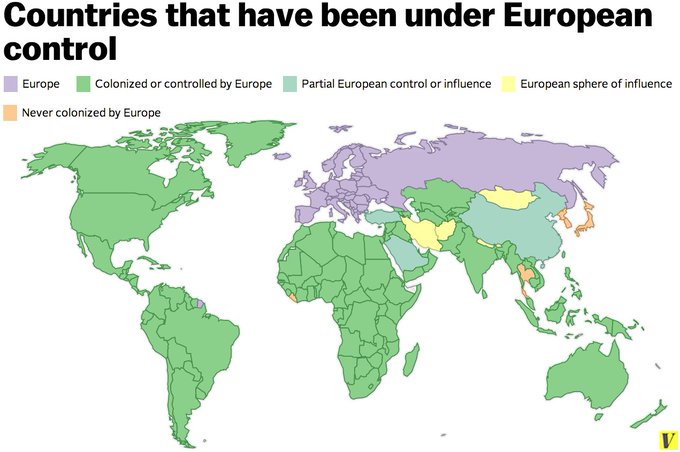Most people don’t really get just how extensive European conquest of the world was.

The map’s a bit inaccurate over in Russia: most of Russia is “not Europe” and was conquered — most of it should be green, like North America. Likewise, Japan was conquered by the US, which is a European colony. Leaving aside their brutal war crimes, they were stupid to pick a fight with an industrialized continental power: there was never any chance of winning against the US, as Admiral Yamamoto told them.
But the point is fairly simple: Europeans made the modern world. Wiped out almost all the natives in North America; conqured all of Africa and South America, and almost all of Asia. We went around and imposed our form of capitalism. We destroyed local industry, as in India (which was at least as industrialized as England before the conquests) and forced the natives to trade with us on negative terms, the most famous example being the two Opium wars to make China allow the Opium trade, since England had almost nothing else the Chinese wanted to buy.
World War I and II were a competition between the European powers (which include the US, who had by then essentially completely wiped out the natives) and the US and USSR, the peripheral continental powers won the war, divided Europe between them, “de-colonized” and then ruled the world between them till the USSR collapsed, at which point the US got to tell almost everyone what to do and how to do it for a good twenty-plus years.
A few nations managed to sort of resist: Cuba, Venezuela, Iran and North Korea, but they were made to suffer vastly for their defiance.
The era ended, I would argue, when Russia sent troops to Syria. They defied the US directly, and fought, and the US backed down. One could argue for Georgia, but it was on Russia’s border. Syria was an assertion that the US could not overthrow any government it wanted and that it didn’t control the Middle East minus Iran.
But Russia, important as it is, is now a junior ally to China. They have the nukes, but they don’t have the economy to stand up to the West and NATO without China’s support, and they know it. The competition is not really between Russia and NATO or Russia and the Ukraine, but China and the US, even though neither side has anything more than observers on the ground.
The Russians have chosen their side: chosen not to be Europeans but to be Asians. They say this frequently, it’s a deliberate choice. If this century is to be the Asian one, Russia will be Asian. This change from looking to Europe and being essentially European is massive, and it’s what makes it possible for China to win. Losing Russia, with its vast resources and land ties to China makes it nearly impossible to use American sea-power to “choke out” China thru trade interdiction.
The coming cold war, and possible hot war (or a series of proxy wars) with China is about whether a non-European power will be allowed to remake the world Europe made. Everyone recognized that the US was Britain’s heir, ruling indirectly, but ruling nonetheless. It is about a different, non-EuroAmerican elite being powerful: people who don’t believe in exactly the same things as the trans-Atlantic rulers.
It is an existential threat to European rule, and it is being treated as such. The “yellow peril” has arrived.
In 30 years, will Mandarin be the the new English? The new lingua-Franca? The language everyone has to know and that you can, if clumsily, get by on almost everywhere?
Absent a major war, likely nuclear, or civilization collapse, I find it hard to see a scenario where China doesn’t become the most important global power. Oh, they have problems–but so does everyone. Cries of how they can’t do it because of culture seem weak to me: China was the civilization leader for most of the last 2,000 years, the idea that Chinese culture can’t produce science, music, arts and all the other flowers of civilization is absurd and they’ve certainly been able to adopt our innovations, just as we previously adopted gunpowder and the printing press from them.
Everything ends. We Europeans had our day in the sun (though my Irish ancestors missed most of it) and now the sun sets, as it always does.